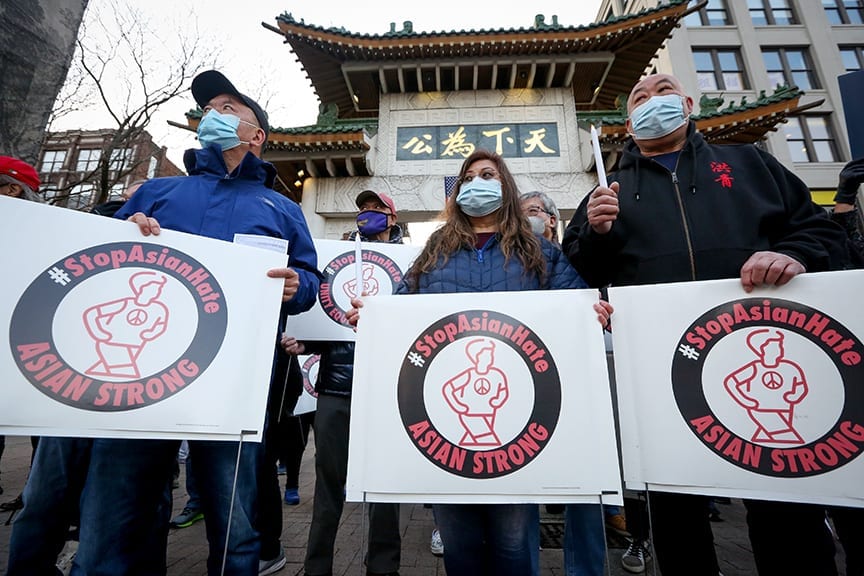
Racial and social justice organizations gathered virtually on Thursday, March 25 to show solidarity for Boston’s Asian American and Pacific Islander community in a town hall hosted by Massachusetts Asian Pacific Islanders Civic Action Network (APIs CAN) and several other groups.
The grief surrounding the murders of eight spa and massage workers in Georgia resounded far beyond the South and was felt deeply by communities around the Commonwealth.
Sharon Cho, who grew up in Atlanta, detailed that grief before inviting the attendees into a moment of silence for the victims.
“We are grieving and we are in pain,” Cho said. “And as we experience this collective grief and anger, I hope we remember that our healing must also be collective, that we honor these eight lives, through our fight for justice, for a better world, where all of us can live with dignity.”
Those eight victims were shot by a man who claims to have a sex addiction and had frequented the spa and massage parlors where the victims worked. Six of those were Asian women. Many in the Asian community are outraged that the shooter was not charged with a hate crime.

About 100 people gather for a candlelight vigil and prayers to honor the victims of violence in Atlanta and elsewhere on March 27, 2021 at the Chinatown gate in Boston. The event was organized by the Chinese Consolidated Benevolent Association of New England. Photo by Angela Rowlings
Angie Liou, the executive director of Boston’s Asian Community Development Corporation and a member of APIs CAN, spoke to America’s history of racism that goes beyond Georgia.
Liou cited the 1880 Chinese Exclusion Act that banned Chinese immigration to the U.S., the internment camps created by the U.S. to imprison Japanese American citizens and hate crimes against Muslims in the aftermath of 9/11. Hate crimes against Asians spiked in 2020, and President Trump’s use of the phrase “China Virus” was widely seen as contributing to negative attitudes against Asians.
“There’s also a long history of gendered racism against Asian women,” Liou said. “There was the 1875 Page Act that hypersexualized Chinese women as prostitutes and effectively barred them from entering the U.S. Let us not forget that 20th-century U.S. military aggressions in Korea, the Philippines and Vietnam have led to sexualization and exotification of Asian women’s bodies.”
Throughout the poetry readings, personal stories and calls to action from Korean, Chinese and Vietnamese community members, activists from the Black community spoke up in support. In a short speech, Tammy Tai, deputy director of King Boston, said that white supremacy tries to divide the Black and Asian community.
“White supremacy and patriarchy will justify standing against policies that save lives, they will stand against strong gun laws. They will justify standing against health care, living wages and voting rights. Dr. King reminded us that love is our most powerful tool in our long march toward hope and justice,” Tai said.
She also acknowledged that the entire group is mourning the loss of these six Asian women in the same month of the anniversary of Breonna Taylor’s death and weeks before the anniversary of Martin Luther King Jr.’s assassination.
“So my hope is that we all stand together in love and solidarity to drive the darkness out with our collective light,” Tai said.
Bethany Li of Greater Boston Legal Services applauded the solidarity she’s seen at the local level.
“When we are working on deportations, when we’re talking about how the prisons lead to a deportation pipeline, that affects not just Southeast Asians. That affects communities of color across the board,” Li said. “When we talk about public education and language access, and we talk about making sure that there’s equity in schools and the discrimination that students face, that is something that affects all communities.”
Li said that while the media doesn’t feed us images of cross-racial solidarity, neighborhoods like Dorchester exhibit it every day.
The following Saturday morning, Asian activists gathered from all over the state to rally and run on Boston Common with the New England Chinese American Alliance. The rally was followed by several others throughout the day in Nubian Square, Springfield and Randolph, hosted by different organizations.
Helen Li and her daughter Annalily attended the Boston Common event with homemade signs, engaging in conversation with other attendees and even a city councilor to make them aware of the issues.
“People don’t normally speak up … it’s considered shameful,” Helen Li said. “If we don’t speak up, who will? There’s going to be a lot of oppression in the future.”
Solidarity speeches at the event from City Councilors Michelle Wu and Ed Flynn and Congressman Jake Auchincloss drew moments of applause and chanting from the large crowd at the Parkman Bandstand.
“We’re not just speaking up from our individual families,” Helen Li said. “Everyone came together.”






